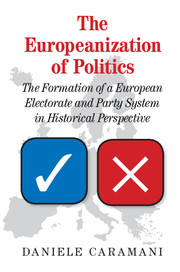 The Europeanization of Politics
The Europeanization of Politics Conclusion: Towards Europe-wide Representation
Published online by Cambridge University Press: 05 November 2015
Summary
In 1774 Edmund Burke, addressing the electors of Bristol, said:
Parliament is a deliberative assembly of one nation, with one interest, that of the whole – where not local prejudices ought to guide, but the general good, resulting from the general reason of the whole. You choose a member, indeed; but when you have chosen him he is not a member of Bristol, but he is a member of Parliament.
Since its first use in the English parliament, representation was based on a territorial, geographical, indeed local principle. Burgesses and knights summoned by the king were representatives of towns and counties (the Commons). For long representation was imposed from above and with democratization the local geographical definition of representation did not change immediately (Morgan, 1988: 43–6). With Burke, however, representation acquires a new meaning: not the representation of particular interests from various territorial constituencies but, as famously stated in the same quote, the vision that “Parliament is not a congress of ambassadors” but rather the site where the same interests across territorial units – say, trade interests in places such as Bristol or Birmingham – are represented. Further, as Pitkin discussed in her seminal treatise on political representation, even towns or regions not enfranchised or represented territorially through a member of parliament may nonetheless be “virtually” represented in a communion of interests and feelings (Pitkin, 1967: 173). More recently, Manin too has written about the importance of representation being “national” rather than local in its historical development (Manin, 1997: 163). In the terminology used in this book, the functional dimension of representation, as opposed to the territorial one, predominates (see Chapter 1).
Historically, in national political systems the actors through which nationwide cross-local interests are represented since the earliest phases of democratization are political parties. Political parties have the role of aggregating the different interests in coherent programmes and ideologies but also of linking the different territorial bits of a country together – in other words, making national representation possible. This is done through the cross-district “linkage” or “coordination” of parties (Cox, 1999) or, what in a different terminology is referred to as their “nationalization, that is the progressive replacement of territorial divisions in the representation process through functional dimensions of contestation.
- Type
- Chapter
- Information
- The Europeanization of PoliticsThe Formation of a European Electorate and Party System in Historical Perspective, pp. 284 - 294Publisher: Cambridge University PressPrint publication year: 2015


